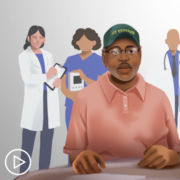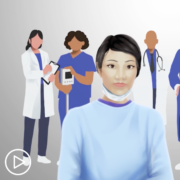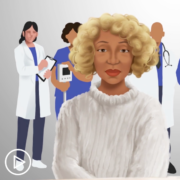Lessons From a Small Cell Lung Cancer Care Partner
Lessons From a Small Cell Lung Cancer Care Partner from Patient Empowerment Network on Vimeo.
As a small cell lung cancer (SCLC) care partner, Anita learned things during her husband Terrence’s cancer journey that she’d like to share to help others. “Communication with the healthcare team and learning about your loved one’s cancer are key to supporting their cancer journey.” She shares lessons learned and specific advice for how to support your loved one in their cancer care.
Disclaimer: Thank you to small cell lung cancer expert Dr. Rafael Santana-Davila, PEN’s Empowerment Leads, patients, and care partners for reviewing and collaborating on this video. This video has been edited to protect the privacy of certain individuals, and the names and identifying details have been changed.
See More from [ACT]IVATED Small Cell Lung Cancer (SCLC)
Related Resources:

|

|

|
Transcript:
Staying ACTIVATED in your loved one’s cancer care is essential to becoming informed, empowered, and engaged in their care, take it from me. My name is Anita. As a care partner to my husband Terrence who has extensive-stage small cell lung cancer (SCLC), I want to share my perspective and lessons learned from his cancer journey.
It was difficult seeing my husband Terrence struggle with a cough that wouldn’t go away. We also now know that he should have received lung cancer screening due to his past history of smoking. As a care partner, I blamed myself for not speaking up at his earlier appointments. How could I have advocated differently?
Though it was challenging learning that the extent of his cancer may have been prevented with recommended screening, I want to share my lessons learned to help other patients and care partners who may be struggling with the impacts of cancer.
Ongoing communication with the healthcare team and learning about your loved one’s cancer are key to supporting their cancer journey. To help your loved one, you can join them at their doctors’ appointments to serve as a second set of ears, to take notes, to ask questions, and to assist in the shared decision-making process. Staying [ACT]IVATED as a care partner continues to be key in helping Terrence connect to the right care at the right time.
My [ACT]IVATION tips for other care partners are to:
- Ask the stage of the cancer and what the lab test results mean.
- Inquire about treatment options and what the doctor recommends for treatment.
- Find out if there’s a clinical trial that is a treatment option.
- Pose questions about the goal or goals of treatment.
- Learn what to expect from treatment impact on daily life and ask about support services.
- Inquire about who you can contact about side effects or other issues.
- Avoid care partner burnout, ask someone for help to ensure you get some self-care and time to recharge.
If you’re a care partner helping a loved one in the fight against small cell lung cancer, knowledge is everything. Stay [ACT]IVATED by being informed, empowered, and engaged in their care.
Share Your Feedback:
Create your own user feedback survey










